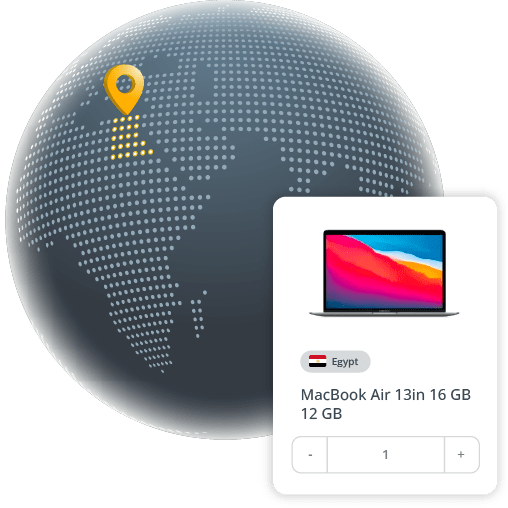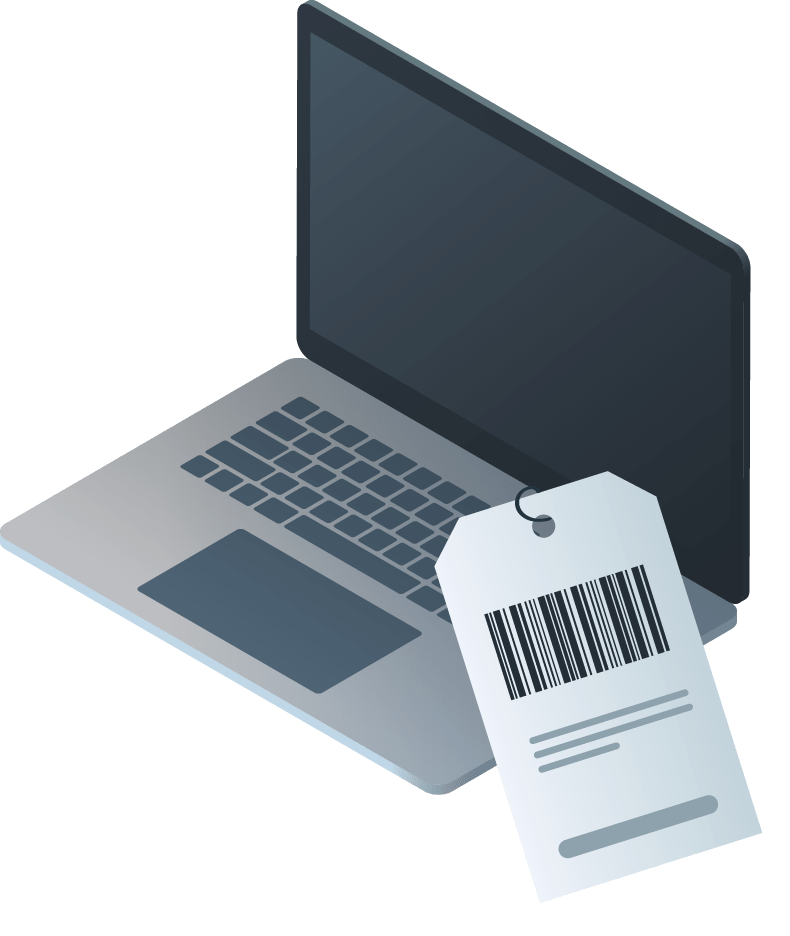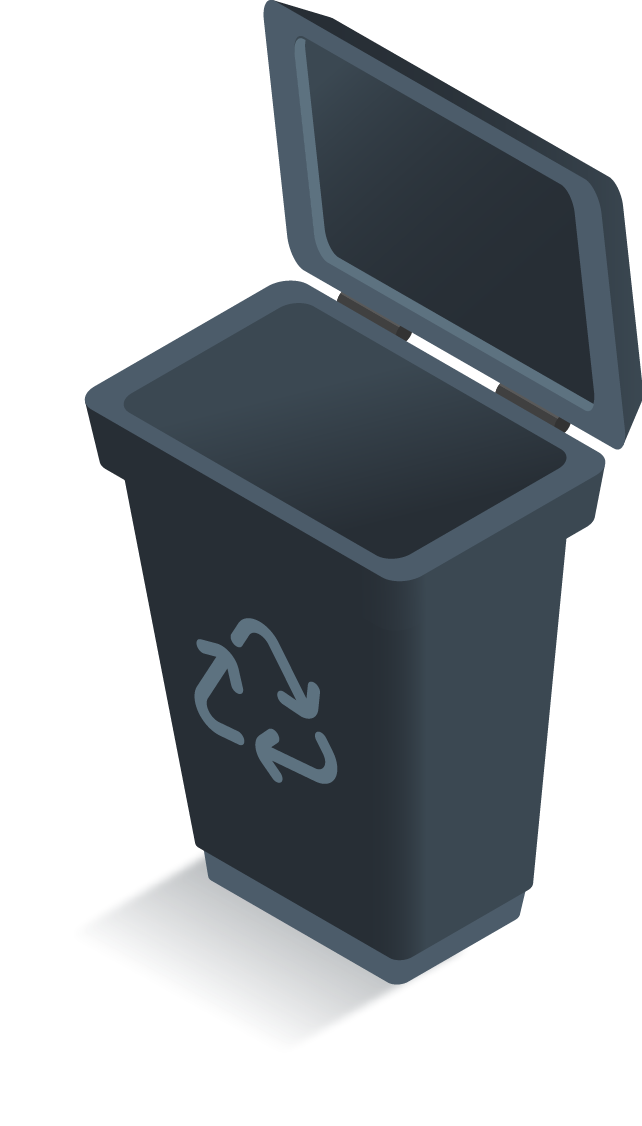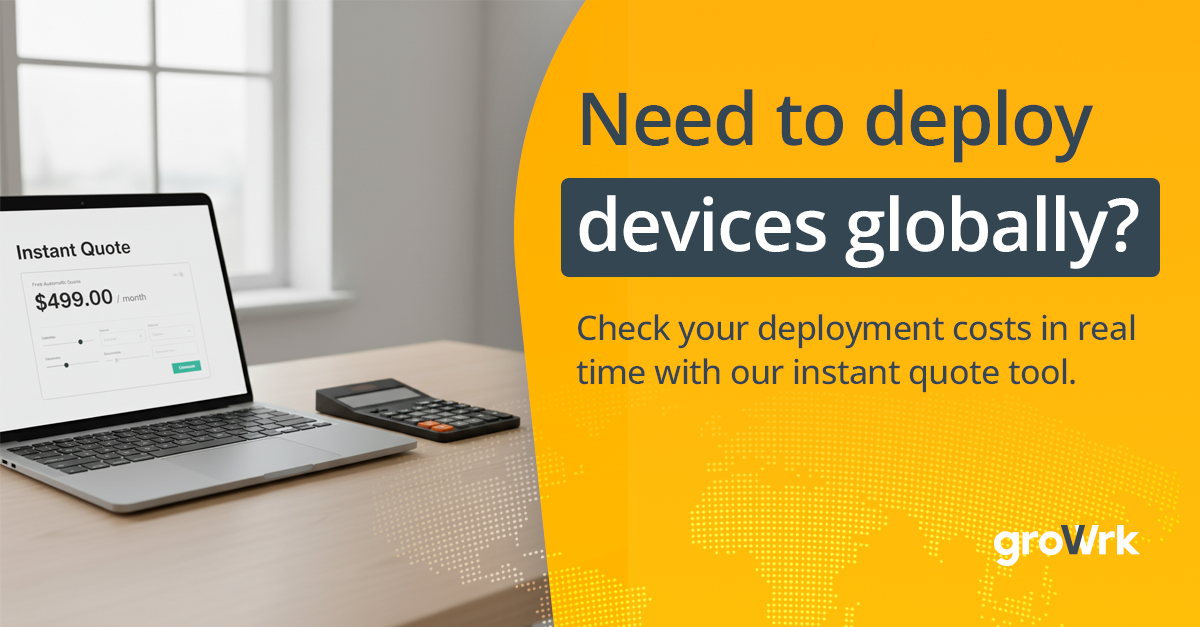How to send IT equipment to Egypt
Are you looking to send IT equipment to remote teams in Egypt? At GroWrk, we specialize in simplifying cross-border IT asset management, ensuring seamless delivery of laptops, servers, and other essential devices to Egypt. From logistics to customs clearance and regulatory compliance, we handle everything so you can focus on business growth.

At a glance
Egypt is a rapidly emerging IT hub in the Middle East and North Africa, with a growing tech industry fueled by digital transformation initiatives. The country is a strategic destination for IT outsourcing, with significant investments in infrastructure, education, and software development.
|
CURRENCY Egyptian Pound (EGP) |
OFFICIAL LANGUAGE Arabic (English is widely used in business) |
TIME ZONE GMT+02:00 Eastern European Time (EET) |
|
CUSTOMS DUTY ON ELECTRONICS 5-20% Typically 5-20% customs duties and 14% VAT |
SHIPPING LEAD TIME 4-10 days (depending on shipping method and customs clearance) |
IT OUTSOURCING MARKET Rapidly growing, with an increasing demand for cloud computing, fintech, and digital transformation services. The market is projected to grow at a CAGR 2025-2029 of 14.47%.by 2025. |
Overview of IT operations in Egypt

Growing IT sector: Egypt’s IT industry is expanding, particularly in fintech, artificial intelligence (AI), and cybersecurity, with government policies fostering digitalization and attracting foreign investments.
Reliable IT infrastructure: The country boasts a strong fiber-optic network, advanced data centers, and expanding cloud computing services, supporting businesses and international corporations.
Skilled workforce: Egypt has a well-trained pool of IT professionals skilled in software development, network security, and AI, making it an ideal location for remote teams.
Regulatory compliance: Egypt enforces strict data protection laws under the Personal Data Protection Law (Law No. 151 of 2020), impacting IT operations and data security practices.
Evolving tech ecosystem: Cairo, Alexandria, and Giza are major tech hubs, home to innovation centers, startup incubators, and multinational IT firms.
Shipping IT equipment to Egypt: What you need to know
| Customs regulations |
|
| Duties and taxes |
|
| Required documentation |
1. Commercial Documents
|
| Customs clearance process |
|
| New vs. Used equipment |
|
| Penalties or fines for non-compliance |
|
Checklist for sending laptops to Egypt
When shipping laptops to Egypt, it’s important to follow a few best practices to ensure the process goes smoothly, and your equipment arrives safely and on time. Here are some helpful shipping tips:

Select trusted couriers: Use reliable couriers such as GroWrk, DHL, UPS, FedEx, or Egypt Post. These carriers offer full tracking and are experienced with Egyptian customs procedures and clearance processes.
Check service levels: Select the appropriate shipping option based on urgency. Express shipping (3-7 days) for high-priority deliveries. Standard shipping (7-14 days) for cost-effective options.
Use high-quality packaging: Secure laptops with sturdy, padded boxes and protective materials like bubble wrap, foam inserts, or air cushions to prevent damage during transit.
Disassemble where possible: If shipping accessories like chargers, docking stations, or monitors, package them separately to prevent damage. Remove detachable components if applicable.
Label clearly: Ensure the recipient’s name, address, and contact details are correctly labeled. Mark the package as "fragile" to encourage careful handling.
Accurate product descriptions: On the commercial invoice, provide a detailed and accurate description of the laptop, including its brand, model, and serial number. Inaccurate descriptions may cause customs delays.
Value declaration: Declare the correct value of the laptop to avoid under- or over-declaring, which could lead to customs inspections or fines. The declared value determines any applicable duties and taxes.
Customs declarations: All international shipments require customs clearance. Include: Copy of recipient’s National ID (for individuals) or tax ID (for businesses), Import Permit or Registration (for business/commercial use), commercial invoice, Waybill, and packing list.
Proof of origin: If applicable, include a certificate of origin to benefit from preferential duty rates under agreements like GAFTA (Greater Arab Free Trade Area) or the Egypt–EU Association Agreement.
Understand import duties & taxes: Laptops typically carry a 0% customs duty, but are subject to 14% VAT. Plus, 1–3% additional fees (e.g., service fees, customs clearance fees), all based on the CIF value (Cost + Insurance + Freight). Used or refurbished laptops may face additional scrutiny and potential inspection.
Pre-pay duties and taxes: Some couriers allow for pre-paid duties and taxes to simplify customs clearance and prevent the recipient from facing unexpected charges upon arrival.
Protect against loss or damage: Consider purchasing shipping insurance for high-value laptops to protect against loss, theft, or damage during transit.
Compliance with Egyptian regulations: Laptops with wireless features may require approval from the National Telecommunications Regulatory Authority (NTRA) for commercial imports. This is less of an issue for personal shipments or low-volume deliveries.
Use tracking tools: Major couriers provide real-time tracking—monitor shipments closely to anticipate customs clearance updates and delivery progress.
Stay in touch with the recipient: Notify the recipient about the expected delivery timeline, tracking updates, and any customs-related requirements to avoid delays.
Expect weather and seasonal delays: Delays may occur during national holidays (e.g., Eid, Ramadan) or periods of extreme heat or sandstorms, which can affect cargo handling and logistics.
Egyptian domestic delivery options: For final delivery within Egypt, consider Egypt Post, Aramex Egypt, Bosta, or Naqla for localized and efficient distribution.

Average cost of IT Equipment in Egypt
Laptops (Business Grade):
- Mid-range: $630 – $1,470 USD
- High-end: $1,470 – $2,940+ USD
High-end models such as Apple MacBook Pro, Dell XPS, and Lenovo ThinkPad are priced on the higher end.
Monitors (Business Grade):
- Standard: $160 – $380 USD
- Ultrawide/4K: $530 – $1,050 USD
Monitors from trusted brands like Dell, Samsung, and LG typically range within these prices, with 4K or ultrawide models costing more.
Desktops (Business Grade):
- Standard Desktop PC: $380 – $1,260 USD
- Workstation Desktop (for high-performance tasks): $1,260 – $3,780+ USD
Prices depend on the brand and specifications, with options from HP, Lenovo, and Apple among the most common.
Printers (Laser):
- Standard Office Printers: $150 – $380 USD
- High-Volume Printers: $735 – $2,100+ USD
Leading brands such as HP, Canon, and Brother offer a wide range of models for office environments.
Public holidays & IT work hours to plan your shipment
Key public holidays in Egypt:
- Revolution Day – January 25
- Sinai Liberation Day – April 25
- Labor Day – May 1
- Armed Forces Day – October 6
- Eid al-Fitr, Eid al-Adha – Islamic calendar-based holidays
Typical work hours for IT professionals
- Standard workweek:
- 40-45 hours per week, typically from Monday to Thursday, 9:00 AM - 5:00 PM.
- Work schedules may vary based on company policies and industry requirements.
- Some multinational corporations align their workweeks with global partners.
- Remote work and flexible hours are becoming more common in the IT sector.
- Overtime regulations:
- Employees may not work more than 12 hours of overtime per week.
- Labor laws mandate overtime pay and vary based on job roles.
- Employers must comply with legal standards to ensure fair compensation.
What to consider when retrieving IT equipment from employees in Egypt
| Local delivery and logistics services |
|
| Inventory management |
|
| Logistics challenges for remote locations |
|
| Equipment agreement with employees |
|
How to dispose of IT equipment in Egypt
E-Waste Recycling:
- Certified e-waste handlers: Ensure responsible disposal of equipment by using registered recyclers who follow environmental regulations and proper e-waste management practices.
- Drop-off recycling centers: Take advantage of designated e-waste recycling centers where old IT equipment can be responsibly disposed of, ensuring compliance with environmental regulations and reducing landfill waste.
Data Destruction:
- Wipe data completely: Use certified software to ensure all sensitive data is permanently erased, preventing unauthorized access and data breaches.
- Physical destruction: Physically destroying hard drives through shredding or degaussing ensures that no data can be recovered, making it a highly secure method of disposal for sensitive information.
Repurposing or Donating:
- Support education & communities: Donate working computers to schools, non-profits, or community programs in Egypt. Many educational institutions and social organizations benefit from donated IT equipment, helping bridge the digital divide and providing access to technology for underprivileged students and communities.
- Internal reuse: Older devices can be reassigned for secondary tasks before disposal. Companies can repurpose IT equipment for less demanding roles, such as training, testing, or administrative functions, extending the lifecycle of devices and reducing e-waste.
Manufacturer Recycling Programs
- Brands like Dell, HP, and Apple offer take-back programs for safe recycling or refurbishment. These programs ensure that old or used IT equipment does not end up in landfills, helping to reduce environmental impact. Many manufacturers provide incentives, such as discounts on new devices, for customers who return old equipment for proper disposal.

Local IT Outsourcing Solutions in Egypt
You can streamline your IT logistics and asset management with GroWrk’s comprehensive global solution. Whether it’s shipping equipment or managing IT assets across multiple regions, GroWrk helps you stay compliant and efficient, every step of the way. Here’s why GroWrk is the ideal partner for managing your IT assets in Egypt:

| 1. Wide global coverage |
With operations in over 150 countries, including Egypt, GroWrk ensures seamless deployment of IT equipment for teams, regardless of their location. Our in-depth knowledge of Egyptian regulations guarantees compliance and efficiency tailored to your business needs. |
| 2. End-to-end asset management |
From procurement to deployment, maintenance, and secure disposal, GroWrk manages the full lifecycle of IT assets. This allows businesses to focus on growth while ensuring smooth and secure IT operations. |
| 3. Intuitive platform for easy deployment |
Our centralized platform simplifies IT equipment management by enabling real-time tracking, shipment monitoring, and asset usage insights. This reduces administrative workload and enhances operational efficiency across Egyptian offices. |
| 4. Smooth delivery and equipment retrieval |
GroWrk ensures the smooth delivery of IT equipment to employees throughout Egypt. We also manage the return of devices from departing employees, making the process cost-effective, streamlined, and hassle-free. |
| 5. Compliance with Egyptian import regulations |
We handle all aspects of IT import compliance, including customs clearance, VAT, and regulations governing electronic equipment. By aligning with Egyptian customs requirements, GroWrk prevents delays and ensures a smooth supply chain. |
| 6. Efficient repairs and maintenance |
From routine servicing to urgent repairs, we coordinate IT equipment upkeep to minimize downtime. Our expert technicians ensure that devices remain in optimal working condition, allowing employees to stay productive. |
| 7. 24/7 Support for peace of mind |
Our dedicated IT asset management support team is available round-the-clock to assist with IT asset management, logistics, and troubleshooting. With GroWrk, businesses in Egypt can rely on expert support at any time. |
Procure, configure, and deploy your IT devices from one platform


